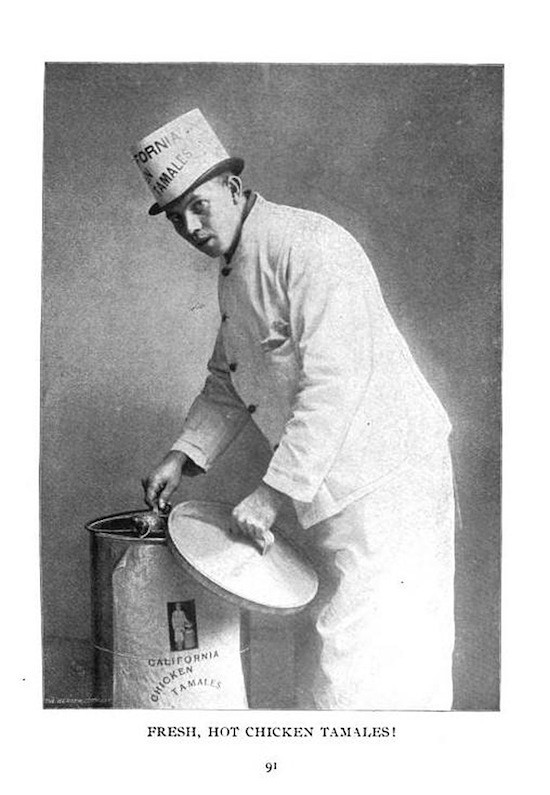
SO…there was a bit of controversy in the food world last week after an Eater LA critic reviewed a elotero in Lincoln Heights. Instead of focusing on the actual execution of the article, though, nearly all the criticism focused on the very act of the article–that is, on Eater's reporter even doing the piece in the first place. Oh, how the accusations flew–that writer Lucas Peterson was columbusing, that he was exposing the poor elotero to retribution from the health department (or worse), that Peterson was a dumb hipster gabacho who was adding to the gentrification of LA's Eastside by doing his story.
Oh, it got nasty. And critics–some in the foodie world, others in Chicano yaktivist circles–got it all wrong.
]
One of the issues brought up from the foodies side was about the supposed ethics of writing about unlicensed street vendors–namely, that food critics somehow have an obligation not to report about them lest the government find out. Not only is that a paternalistic approach–you don't think these vendors, many of whom outwitted la migra to get here, all of them adults, know the risks of their job and how to handle them?–that robs these men and women of their agency, it also ignores history. Reporters have written about street vendors in Southern California as long as there's been newspapers in Southern California–sometimes as exposés, but usually in praise, in an effort to bring more business and renown to the vendors. Authorities have historically swooped in not because of newspaper reports, but because of competitors ratting them out–hell, I have newspaper clippings of Los Angeles' tamale wagon wars of the 1890s that attest to that.
The only ethic that food writers should follow is not accepting free food–other than that, anything in our beat is not only game for coverage, but our duty. Period. Leave the hemming and hawing to a Lit J course at Columbia Journalism School, while another reporter or Yelper beats you to the click.
And that leads to the real underlying issue in this brouhaha, this one from the yaktivist side: the politics of someone called Lucas Peterson venturing into a Mexican community and writing about it. Hey, I get it: communities like Lincoln Heights, Boyle Heights, Cypress Park, Highland Park and others are under assault from hipsters. And from the inconsistent use of Spanish to “authenticate” Peterson's experience (he came off like Charles Fletcher Lummis–look him up, chipsters!–going on and on about poco tiempo) to using mixed metaphors–“You ignore the sounds of your arteries begging you for mercy,” Peterson wrote; um, yeah…–the article reads like a manual for Manifest Destiny.
But that's the fault of Peterson's editor, not Peterson. The editor should've played down the sensationalist aspects of the piece and made him stick to the food. Making a huge buzz about eloteros at this point in the Southern California story is like raving about In-n-Out–been there, done that. Just write about the food, maybe make a note about gentrification, and you're done.
Yet not only did Peterson essentially apologize for pursuing a story, not only did he reveal that the elotero had consented to the story (what: food critics now have to tell the people they review that they're reviewing them?) the poor guy was reduced to blood quantum pendejadas, revealing in a subsequent post that he's half-Chinese–“have Chinese immigrants on my mom's side,” he pleaded to the angry masses. Pathetic on both sides.
And this is where the hypocrisy of the elotero episode reveals itself.
[

For years, food critics in Southern California have written about illegal street vendors or places–everyone from Jonathan Gold to Daniel Hernández to myself and my compas Javier Cabral and Bill Esparza (hell, the latter two are on the road to becoming TV stars for their uncanny nose for finding the best illicit food around). But none of us have ever been accused of exploiting street vendors–maybe because we're better writers (at least Jonathan, Javier, and Bill), sure, but most likely because we fit the right raza profile.
Both yaktivists and foodies caring for the well-being of street vendors is appreciated, but they miss a bigger point: government has pursued a scorched-earth policy against street vendors in Southern California for more than a century, but they always end up on the losing side of history–only via exposure, though. The Los Angeles City Council might have outlawed the old tamale wagons in the 1920s, but they just regrouped as food trucks, then loncheras. SanTana is getting ready to regulate taco trucks again–and they'll lose. Even if we food critics stop writing about them–and in this day and age, it's impossible–the eternal war between government and street vendors will never end. If anything, it's writing about pendejo health inspectors and stupid politicians that rallies the public at large to fight for those vendors.
So write, food writers, about street vendors. Write about it, non-Mexicans, without apologizing for writing about it (though be ready to defend your writing in a non-weepy-moany way). And for everyone else perturbed about such writings: go eat a taco already.
Email: ga*******@oc******.com. Twitter: @gustavoarellano.
Follow Stick a Fork in It on Twitter @ocweekly or on Facebook!

